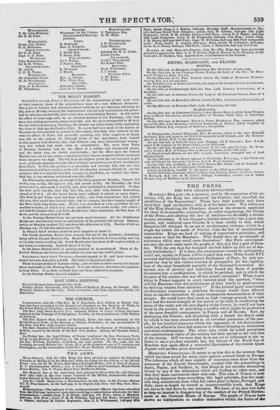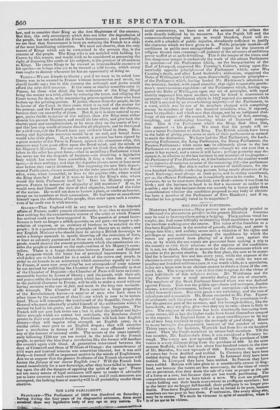THE PRESS.
THE NEW FRENCH REVOLUTION.
MORNING HERALD—In a moment, and by the expression of his ar- bitrary mill, the King has subverted the Charter, and cancelled the conditions of the Restoration.!. There have been popular and there hale been regal revolutions—this is of the latter sort. The ordinance of the King dissolving the Chambers almost at the moment appointed for them tare-assemble--.suspending, or rather suppressing, the liberty of the Pressa.,and altering the law of elections—is decidedly a revolu. tionary movement. It has changed a limited monarchy into a pure des- potism, and conferred upon Charles X. a fame similar to that which Gustavus III. obtained by an act of revolutionary violence, which in a single day erased the name of Sweden from the list of constitutional monarchies. Kings are fond of talking of conservative principles, and none more so than the Bourbons. Why should they set an example of subversion which may recoil upon themselves ? Our Paris correspond- ent says the news came upon the people of that city like a peal of thun- der. Will the arm that has launched the bolt follow up this act of des- potic intimidation ? If it does, the consequences cannot be anticipated ; and if not, royalty in France will be weaker than ever. When Louis XVL arrested and banished the refractory Parliament of Paris, he only pre- pared the way by this violent exercise of prerogative for the organize, Lion of the more formidable assembly of the National Convention. Al- ternate acts of severity and indecision fanned the flame of popular discontent into a conflagration, in which he perished, and in which the dynasty of his ancient race was all but utterly consumed ! What is now doing in France suggests to every rational mind the question, "when will the Bourbons turn the misfortunes of their family to good account by deriving wisdom from adversity ?" If the Liberal party entertained revolutionary intentions, a judicious Sovereign would have allowed them to commit themselves by some intemperate demonstration of their designs. He would have then stood on high 'vantage-ground, he would have had the moral strength of the nation at his back in vindicating the peace of the realm and the just dignity of the Crown, he would not have stood in the position of provoking a conflict which might be productive of the most dreadful consequences to France and all Europe. Now, by destroying the Charter, and dissolving with a breath the Royal oaths by which it has been consecrated as an inviolate possession of the peo- ple, he has justified measures which the opponents of his Government could not otherwise have had recourse to without bringing on themselves universal condemnation. The abyss into which he would precipitate the constitutional rights of the country has been opened at the very foot of the throne. Still we trust that he is not yet so infatuated as not to listen to mote prudent counsels, lest the history of the Royal line of Bourbon may again afford a mournful illustration of the maxim Quern Jupiter vult perdere prius dementat MORNING CHRONICLE—It seems to us that this is the severest blow which has been struck for many years against crowned heads in Europe. The inference which all men capable of reasoning must draw from the measures of the French Government, coupled with the proceedings in Spain, Naples, and Sardinia, is, that Kings do not consider themselves bound by any of the obligations which are binding on other men, and that they deem convenience their only rule. This case of France is such a glaring departure from everything like legal principle, that the suspi- don long entertained, from what has taken place in Spain, Portugal, end Italy, must at length be viewed as incontrovertible truth, that Kings are not to be tied down by any contracts. We know of no men who base so dePp an -interest in disapproving of the conduct of the French eniern.. xnent as the Crowned Heads of Europe. The people of France have shown no indisposition to confine themselves within the limits of the
law, and to consider their King as the first Magistrate of the country. But this, the only sovereignty which does not infer the degradation of the people, has not satisfied the French Government ; and accordingly, we see that that Government is bent on reducing the French to a state of the most humiliating subjection. We need not observe, that the only tenure of Kings which can be recognized in the present day, is the consent of the people. The King who is not satisfied with holding his Crown by this tenure, and would wish to be considered as possessing the right of disposing like cattle of his subjects, is the greatest of all enemies to Kings. lie causes Kings to be viewed as irreconcileable enemies of his species—as beings who are to be treated as wild beasts, which every man ought to destroy whenever he has an opportunity of doing so.
Tiaras—We are friends to liberty ; and if we were to be asked how liberty was to be secured in France without insurrection and revolt, we should hardly say ; but in this country the tribunals and juries would afford the next civil resource. If the same or similar remedies exist in France, let those who think the late ordinance of the King illegal bring the matter to a trial, either by refusing the taxes, and obligineb the Court to sue for them, or by commencing process against those who have broken up the printing-presses. If juries, chosen froin the people, decide in favour of the Court in these cases, there is an end of the matter for the present, and the French people cannot have liberty and the charter, because. they are unworthy of them. But if, as it is more natural to ex- pect, juries decide in favour of the subject, then the King must either dismiss his present Ministers, and recall his late edict, and give back the charter pure and unsophisticated, or he must shut up the courts of law; and this last step would of course dissolve all allegiance, and be the signal for a civil war,—if the French have any civil-war blood in them. Rea- soning and legitimate resources would be at an end, and brutal force would take their place. If, as it is stated, a protest has been signed by a great number of the Peers in France, against the obnoxious edict, this measure may have great effect upon the Royal mind, and the minds of his Majesty's al inisters. For our own parts we think that the objection taken to the edict has great force,—that in annulling a Parliament which has never sat for the despatch of business,—in dissolving a legislative
body which has never been assembled, it fires a shot into a vacant space,— it does nothing ; and that the deputies chosen must at least meet once before they can be dismissed. But supposing the new little depart- mental Parliament, chosen according to the rules prescribed in the Royal edict, were, when assembled, to lean to the popular side, where would the King then be ? And if it were to lean to the King's side, where would the little Parliament itself be ? Does his BIajesty expect to govern France by means of an oligarchy of 258 members ? If so, he
-would soon find himself the slave of that oligarchy, instead of the ruler of the nation. He would not dare to bestow a place, or confer an honour, except on .its members or their connexions. He had better at once throw himself upon the affections of his people, than enter upon such a course, even if he could run it wich'Succese.
GxeseEThat England will in any way interfere in the internal affairs of 'France; under prent circumstances, is an idea so mole:trona; that nothing but the extraordinary nature of die crisis at which Prance has arrived could ever have suggested it. The question of armed inter- ference is here no longer a selfish question on our part—no longer a cal- culation of expense, or an estimate of burdens to be entailed on the people ; it is a question where the principles of liberty are at stake ; and any English Minister who should dare to advise a British Sovereign to assist a foreign monarch in openly throwing off the restraints of laws, at least as solemnly guaranteed as those on which our own liberty de- pends, would deserve the utmost punishment which the constitution en- ables the people to demand on the malversations of his Majesty's coun- sellors. There is a happy distinction between France and England. The prospects which the latter has of practical improvement in her civil policy are to be looked for in a union. of the crown and people, in order to set bounds to an aristocracy which encroaches equally on both. In France, if some new coup d'etat be not attempted—if some scheme be not devised for nullifying the Chamber of Peers as effectually as that of the Chamber of Deputies—the Chamber of Peers will form an insur- mountable barrier in favour of liberty ; and the people, with their aid, and protected by the independent spirit which has so often done honour to the judicial character in France, will be able to make a stand without having recourse to the voie de fait, and must in the long run undoubt- edly triumph. The Chamber of Peers contains a large proportion of the Revolutionary leaven—a nurre;er of men who have risen in other times by the assertion of that liberty which is now to be immo- lated. These will remember the watchword of the Republic, though the General who most effectually availed himself of the enthusiasm which it excited be laid in his grave, and, the Bourbons hope, forgotten. The French will not now look to his son ; but if, after the judicial and legis- lative struggle which we cannot but anticipate, the Bourbons should persist in their now avowed designs, Frenchmen will look into English history—they will inquire what strength an English army, in a similar crisis, once gave to an English despot ; they will examine how a revolution in favour of liberty was once effected without any of the horrors of internal strife. The terrors of the years immedi- ately following 1789 are yet too recent in the minds of the French
• people, to permit the idea that a revolution like the former will desolate the country again with blood. A generation intervened between the days of Cromwell and those of William of Orange : the remembrance of civil wars and internal miseries was somewhat blunted, but it was still lively—it formed still an important motive in the minds of Englishmen. Are we to suppose that the greater liveliness of the French character will hasten the fulness of our slower English time Will the French look round immediately for a new Sovereign, after they have failed in impress- ing upon the old the dangers of opposing the spirit of the age ? There are too many means of legal resistance still open to render it advisable yet to have recourse to such extreme measures ; and if such measures are attempted, the lurking fears of anarchy will in all probability render them abortive.



























 Previous page
Previous page